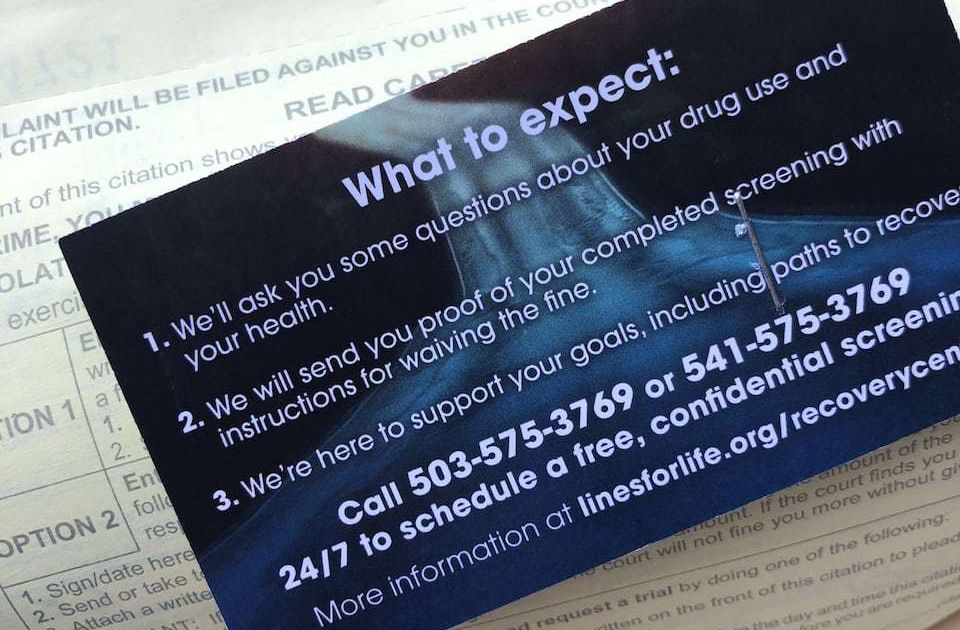Politics
GOP releases Jan. 6 clip of Pelosi saying 'I take responsibility' as she discussed National Guard absence
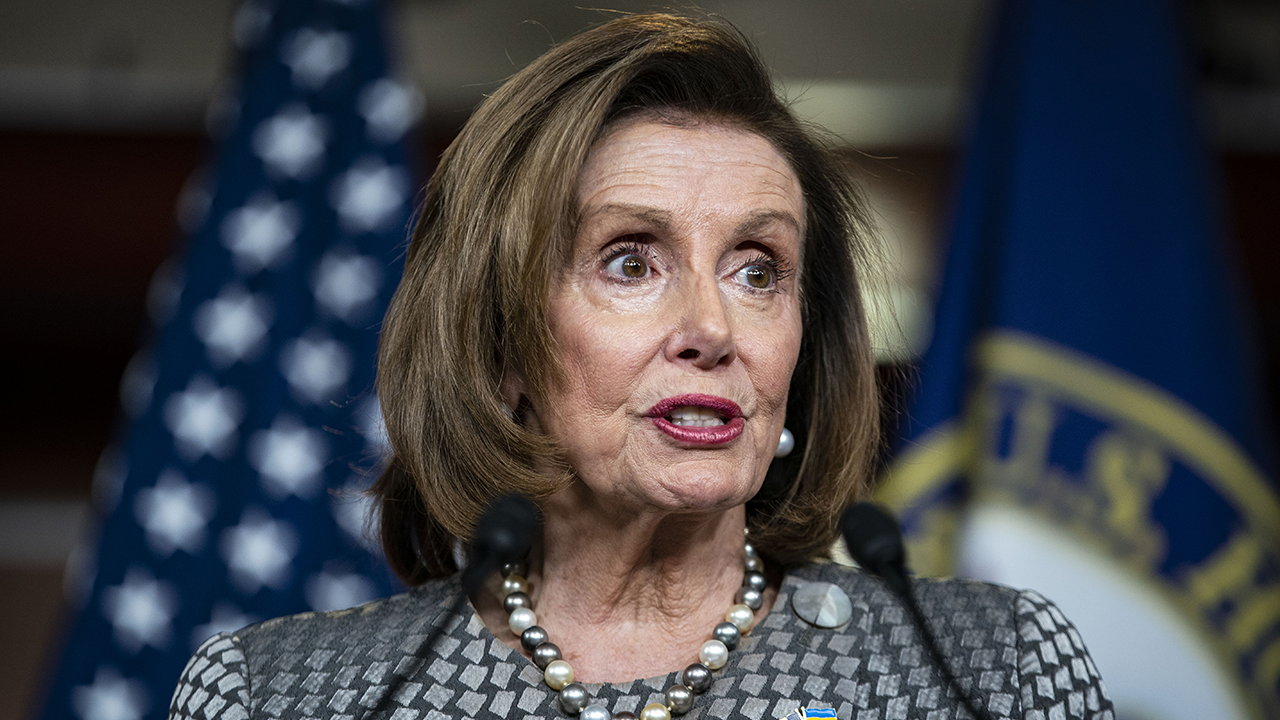
A previously-unreleased video taken on Jan. 6, 2021 shows then-Speaker Nancy Pelosi, D-Calif., saying she takes “responsibility” for law enforcement’s lack of preparedness when a mob stormed the U.S. Capitol that day.
A Tweet on X by a House Republican panel contains video that appears to show a frustrated Pelosi being evacuated from the Capitol complex and in intense conversation with Chief of Staff Terri McCullough about how the evacuation was conducted.
“We have responsibility, Terri. We did not have any accountability for what was going on there. And we should have,” Pelosi says in the video, which was reviewed in its original form by Fox News Digital. “This is ridiculous. You’re going to ask me in the middle of the thing when they’ve already breached…that, should we call the Capitol Police? I mean the National Guard? Why weren’t the National Guard there to begin with?”
Her aide appeared to reply that Capitol security did believe they were prepared, to which Pelosi continued, “They clearly didn’t know, and I take responsibility for not having them just prepared for more.”
DOJ WILL NOT TURN OVER BIDEN’S RECORDED INTERVIEW WITH SPECIAL COUNSEL HUR TO CONGRESS
Former House Speaker Nancy Pelosi is the subject of newly unearthed video from Jan. 6, 2021 (Getty Images)
Pelosi then appears to take a shot at former President Trump’s supporters, who ransacked part of the Capitol including her office.
“It’s stupid that we should be in a situation like this, because they thought they had what- they thought these people would act civilized? They thought these people would give a damn?” Pelosi said. “What is it that is missing here in terms of anticipation? They give us a piece of paper that says walk through the tunnel, don’t walk outside. That’s your preparation?”
When reached for comment on the video, a spokesperson for Pelosi told Fox News Digital, “Numerous independent fact-checkers have confirmed again and again that Speaker Pelosi did not plan her own assassination on January 6th.”
BALANCE OF POWER: MESSY GOP PRIMARIES COULD BOOST DEMOCRATS IN SWING STATE RACES

The video showed her being evacuated as Trump supporters stormed the Capitol (AP Photo/Jose Luis Magana, File)
“As the footage in its entirety plainly shows, Speaker Pelosi sprang into action in response to the attack on the Capitol — mobilizing the defense of the Capitol, urging the Administration to deploy the National Guard and coordinating the continuity of government. Cherry-picked, out-of-context clips do not change the fact that the Speaker of the House is not in charge of the security of the Capitol Complex — on January 6th or any other day of the week,” the spokesperson said. “Three years later, House Republicans are still attempting to whitewash the deadly insurrection.”
House Republicans, however, say the clip undercuts Pelosi’s assertions that Trump was to blame for the Jan. 6 riot.
HOUSE GOP REPORT ALLEGES JAN 6 COMMITTEE ‘DELETED RECORDS AND HID EVIDENCE’
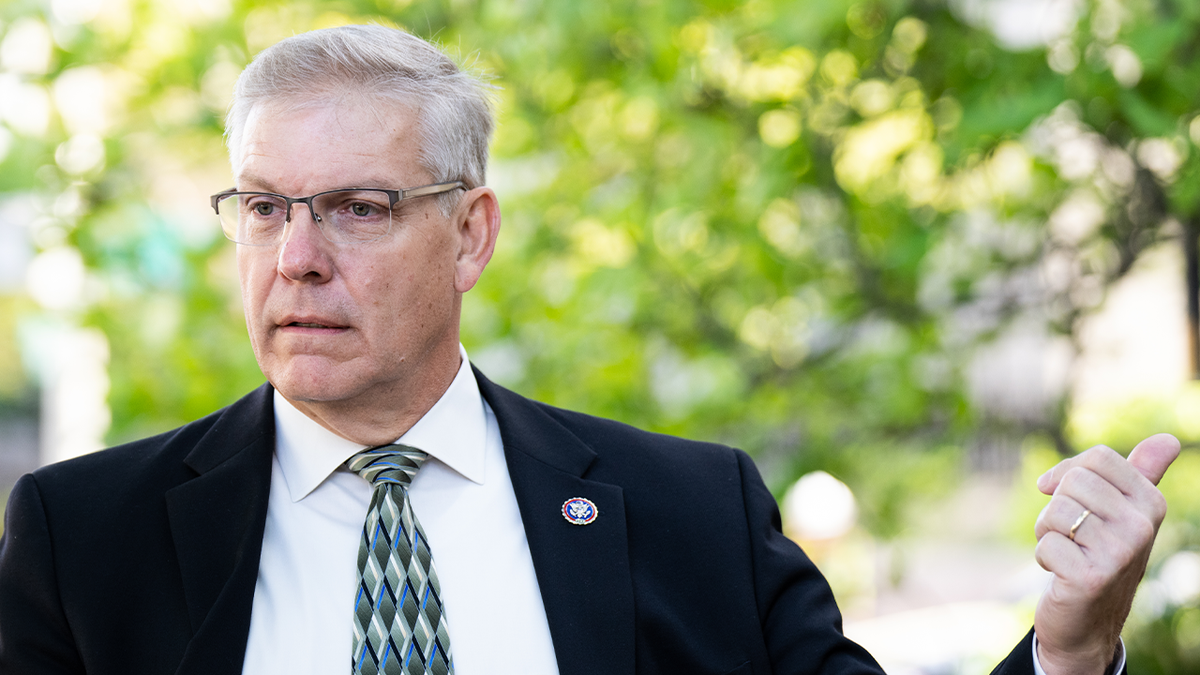
Fox News Digital obtained the clip from the House Administration Committee’s subcommittee on oversight, which is led by Rep. Barry Loudermilk (Getty images)
“Pelosi’s J6 Select Committee spent taxpayer’s money chasing false political narratives and using Hollywood producers for their ‘investigation.’ Her admission of responsibility directly contradicts their own narrative,” tweeted Rep. Barry Loudermilk, R-Ga., chair the House Administration Subcommittee on Oversight.
Fox News Digital reached out to Loudermilk for further comment.

Politics
Trump announces to crowd he 'just took off the last bandage' at faith event after assassination attempt
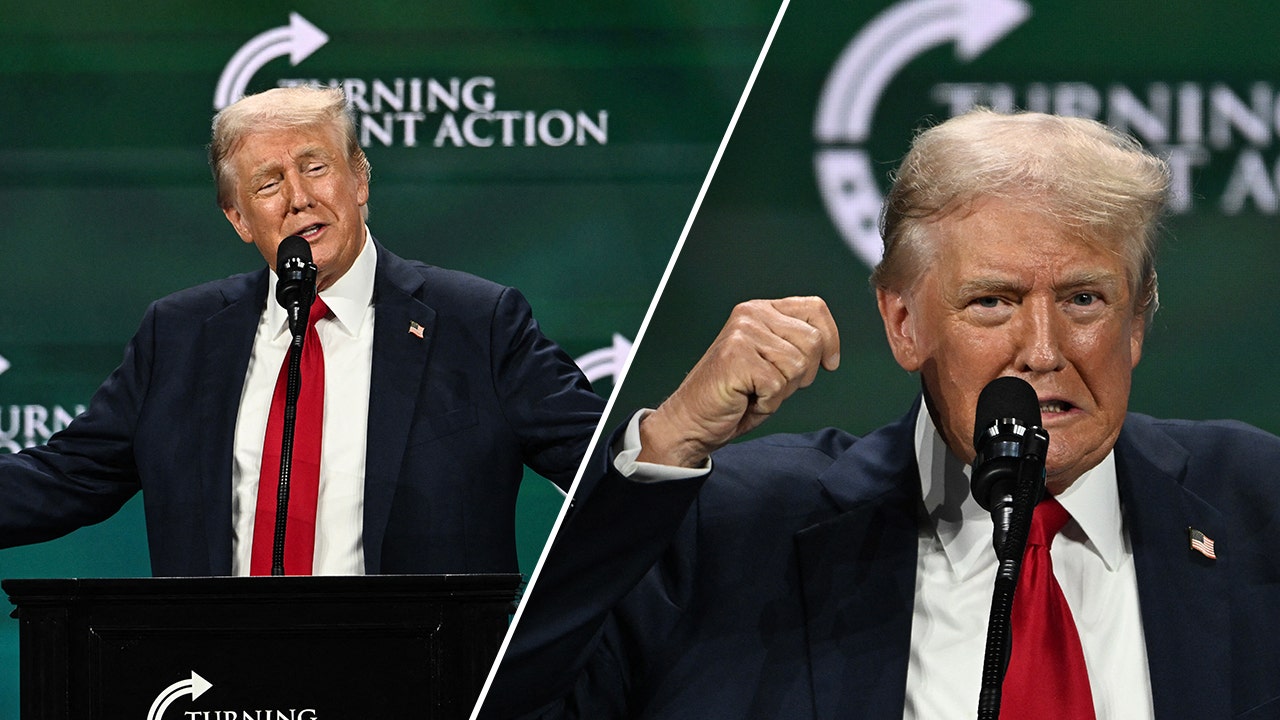
Former President Trump announced to a crowd Friday night he “just took off the last bandage” from his ear after an attempted assassination nearly two weeks ago.
The Believer’s Summit, hosted by Turning Point Action in West Palm Beach, focused on reaching voters of faith. Dr. Ben Carson, former HUD Secretary, preceded the former president.
“And we want to thank each and every one of the believers in this room for your prayers and your incredible support. I really did appreciate it,” Trump said.
TOP DEMOCRATIC SUPER PAC LAUNCHES MASSIVE $50M AD SPEND FOR HARRIS LEADING UP TO DNC
“Something was working. That we know. Something was working. So, I thank you very much. And I stand before you tonight, thanks to the power of prayer and the grace of Almighty God,” he added.
“As I think you can see, I’ve recovered well. And, in fact, I just took off the last bandage off of my ear.”
Former President Trump, the 2024 Republican presidential nominee, speaks at Turning Point Action’s Believers Summit in West Palm Beach, Fla., July 26, 2024. (Chandan Khanna/AFP via Getty Images)
The crowd roared with applause as the former president gestured to his injured ear.
“I just got it off,” he clarified. “I took it off for this group. I don’t know why I did that for this group, but that’s it. I think that’s it.”
Trump’s speech included attacks against his presumptive Democratic opponent, Kamala Harris, calling the vice president “a bum.”
“Three weeks ago, she was a bum, a failed vice president and a failed administration with millions of people crossing. And she was the border czar. Now they’re trying to say she never was,” the former president said.
TRUMP’S FORMER DOCTOR GIVES HEALTH UPDATE, CALLS OUT WRAY AS FBI AFFIRMS BULLET STRUCK FORMER PRESIDENT
“If radical liberal Kamala Harris gets in and, by the way, there are numerous ways of saying her name, they were explaining to me. … I said, don’t worry about it.
“Doesn’t matter what I say. I couldn’t care less if I mispronounce it or not. I couldn’t care less.”
Dr. Ronny Jackson, the former White House doctor, released a letter earlier Friday offering an update on Trump’s health after the assassination attempt July 13 in Butler, Pennsylvania.
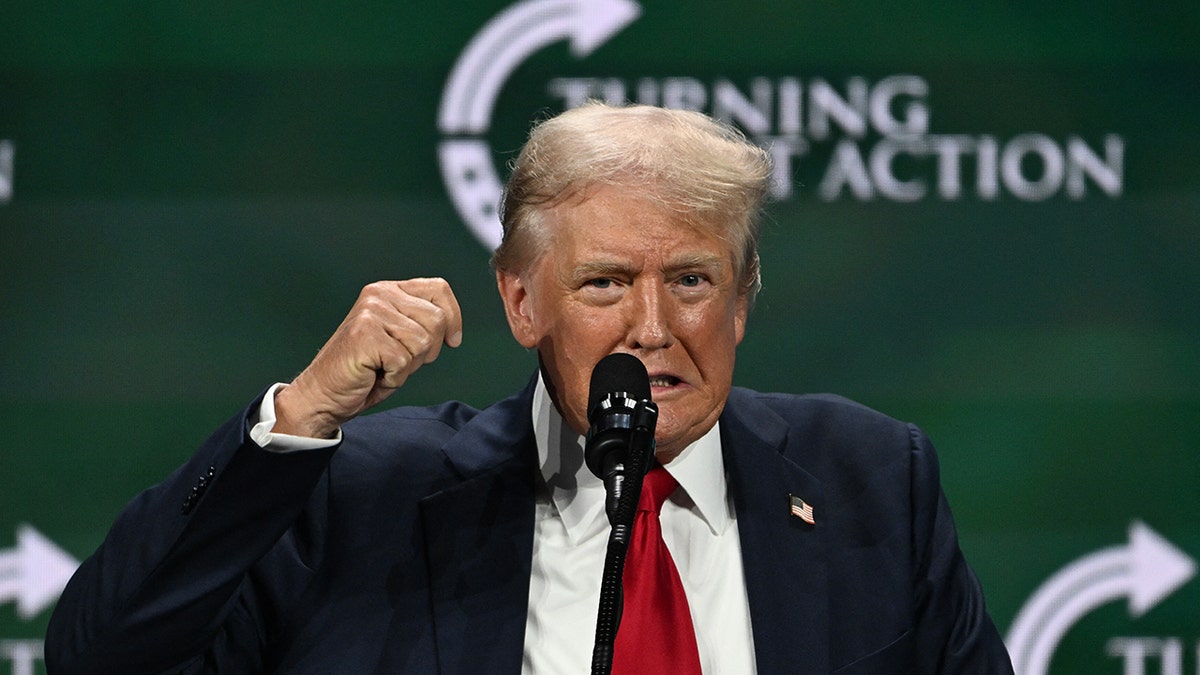
Former President Trump, the 2024 Republican presidential nominee, speaks at Turning Point Action’s Believers Summit in West Palm Beach, Fla., July 26, 2024. (Chandan Khanna/AFP via Getty Images)
“I want to reassure the American people and the rest of the world that President Trump is doing extremely well,” Jackson said.
“He is rapidly recovering from the gunshot wound to his right ear. I will continue to be available to assist President Trump and his personal physician in any way they see fit and will provide updates as necessary and with the permission of President Trump.”
“What struck former President Trump in the ear was a bullet, whether whole or fragmented into smaller pieces, fired from the deceased subject’s rifle,” the FBI confirmed Friday to Fox News Digital.
Trump and running mate JD Vance, the Ohio senator, are scheduled to appear for a campaign rally in St. Cloud, Minnesota, Saturday.
Politics
From Let's Go Brandon to Let's Go Brenda. Trump merch sellers say they'll be just fine after Biden exit

Vincent Scuzzese runs a store in New Jersey named Let’s Go Brandon.
Yes, that Let’s Go Brandon, the pro-Trump mantra gracing Scuzzese’s merchandise — shirts, flags, mugs, makeup compacts and more. There’s a Let’s Go Brandon adult coloring book (subtitle: “The Story of the WORST President in U.S. History”). And for the athletic, a 32-inch Let’s Go Brandon skateboard.
So, what happens now that “Brandon” himself has dropped out of the presidential race and endorsed his second-in-command, Vice President Kamala Harris?
A rebrand.
Scuzzese’s shelves now offer merch with a new motto: Let’s Go Brenda.
“My sales are going nuts,” said Scuzzese, 59, who opened his store in a strip mall off Route 37 in Toms River, N.J., two years ago. “Biden dropped out, but Kamala has the same views — even worse views. She’s more socialist.”
After Biden quit the race Sunday, social media quickly filled with jokes about warehouses full of rotting, deeply discounted anti-Biden merch and Let’s Go Brandon flags flying at half-staff. One meme includes an altered photo of a marquee sign for a different Let’s Go Brandon store; the memester added a fake banner for Spirit Halloween, the seasonal retailer that pops up in empty stores.
But the folks selling anti-Biden swag say they will be just fine, thank you very much.
“Dear Liberal Snowflakes, We appreciate your fan emails and phone calls voicing your concerns in regards to our now ‘useless inventory’ since the Sleepy Joe dropout. We understand that liberals don’t have an IQ of even two digits and have no idea how printing businesses work,” the website for the Let’s Go Brandon Online Shop read on Thursday.
Even if Let’s Go Brenda — the female version of Brandon — catches on, the original slogan doesn’t appear to be going away anytime soon.
The crass catchphrase, which began as a sort-of-but-not-really inside joke among supporters of former President Trump, became so ubiquitous that the Republican National Committee sells its own Brandon-branded beverage koozies, bumper stickers and grilling irons.
“It was a way to signal to other MAGA people that they’re in the club and to signal to the liberals in the community that they’re not welcome,” said Tim Miller, a former RNC spokesman, who left the GOP in 2020 and is now a Trump critic.
“I’m sure there will be plenty of anti-Kamala slogans,” Miller said. But Brandon “might stick around,” he said, like Trump’s Make America Great Again slogan and MAGA acronym, as well as the red hats.
The Let’s Go Brandon jeer came from a viral video of NASCAR driver Brandon Brown being interviewed in October 2021 by an NBC reporter after winning his first Xfinity Series race at the Talladega Superspeedway in Alabama.
In the crowd, people chanted, “F— Joe Biden!” The reporter, apparently trying to cover up the obscenity, suggested they were yelling, “Let’s go, Brandon!”
Let’s Go Brandon is an anti-Biden slogan seen on countless flags, shirts and merchandise across the country.
(Anadolu Agency via Getty Images)
The taunt later inspired pro-Biden memes with a laser-eyed alter ego of the president called Dark Brandon. Although Biden embraced the image and his campaign sold its own Dark Brandon swag, the meme never came close to overtaking Let’s Go Brandon.
Or, for that matter, the vulgar acronym FJB — it means what you think it means — which adorns countless flags and bumper stickers across the country.
Outside the Thunder-Rode motorcyle accessories shop on Route 66 in Kingman, Ariz., owner Jack Alexander flies a flag with an anti-Biden expletive. He’s got some inside, too. They sell well, he said.
For now, he has no plans to get rid of them. Alexander said it does not make sense “to spend a lot of money” on new merch before the party’s nomination becomes official at the Democratic National Convention in Chicago next month.
“We don’t think Harris is going to make it past the convention,” Alexander said. “We feel there’s going to be a war within the Democratic Party because of the non-election process that put her where she is.”
In New Jersey, Scuzzese said sales at the Let’s Go Brandon store have been through the roof since the failed assassination attempt against Trump during a July 13 rally in Butler, Penn. That night, Scuzzese said, he was so busy that he kept his store open long past closing time.
“Before he got shot, people were afraid to wear his hat and put his flags on their house,” Scuzzese said. Afterward, “they were coming in and buying hats and saying, ‘I’m not taking this hat off. I’m wearing it proudly. I hid it for long enough.’”
Scuzzese quickly hawked shirts with the iconic photo of a bloodied Trump raising his fist in front of the American flag. And his Let’s Go Brenda shirts were on the shelves within two days of Biden quitting the race.
Despite Biden’s exit, Scuzzese has no plans, at least for now, to change the name of his business.
And the Let’s Go Brandon phrase itself?
“At least until the election,” Scuzzese said, “it ain’t going nowhere.”
Politics
Park Police union says officers ‘did everything they could’ during DC anti-Israel riot

Following the protests at Union Station by anti-Israel agitators defacing federal property in protest of Israeli Prime Minister Benjamin Netanyahu’s address to Congress, a Park Police union is pushing back against criticism that only a few arrests were made.
Thousands of Hamas-sympathizing agitators descended on Washington, D.C., Tuesday, at one point defacing federal monuments with phrases in support of the terrorist group responsible for the Oct. 7 attacks in Israel, saying, “Hamas is coming.”
Twenty-three people were arrested at the protests, but some have suggested that number should have been higher.
Sen. Marco Rubio, R-Fla., posted on X, “How many more times are they going to allow leftist degenerates who support terrorism and hate America to vandalize property and attack police? There should have been hundreds of arrests today in D.C. not just 23.”
HOUSE REPUBLICANS REPLACE AMERICAN FLAGS AT UNION STATION AFTER ANTI-ISRAEL PROTESTS
The Columbus Memorial Fountain at Union Station during an anti-Israel protest on the day Israeli Prime Minister Benjamin Netanyahu addressed a joint meeting of Congress on Capitol Hill in Washington July 24, 2024. (Reuters/Seth Herald)
But the U.S. Park Police Labor Committee is pushing back.
“Our officers on the ground did everything they could to protect life and property. In fact, despite having only 29 officers available to mitigate damage — 29! — with no additional help from the Department of the Interior, we processed several arrests for charges ranging from assault on a police officer to destruction of government property,” Kenneth Spencer, chairman of the United States Park Police Fraternal Order of Police, said in a statement.
“That’s why it’s so disheartening to hear some members of Congress and members of the media, many of whom describe themselves as ‘champions’ of law enforcement, suggesting that officers gave protesters a ‘pass’ or that insufficient arrests were made.
“Nothing could be further from the truth. Anyone who truly cares to understand the problem would see that our officer staffing crisis is at the root of our agency’s mission readiness. A small unit of 29 officers arrested 10 individuals while being assaulted by a mob of thousands. We simply did not have the staffing or resources to accomplish a mass arrest operation.”
SEE IT: THE MOST DRAMATIC PHOTOS FROM WEDNESDAY’S PRO-HAMAS WASHINGTON, D.C. PROTESTS

An anti-Israel demonstrator sprays graffiti on the Christopher Columbus Memorial Fountain at Union Station on the day of Israeli Prime Minister Benjamin Netanyahu’s address to a joint meeting of Congress on Capitol Hill in Washington July 24, 2024. (Reuters/Nathan Howard)
At least one demonstrator, whose face was covered, was spotted by Fox News carrying what appeared to be the flag of the terrorist group Hamas while others were heard shouting “Allahu Akbar.”
KAMALA HARRIS REACTS TO ANTI-ISRAEL RIOTS AT DC’S UNION STATION
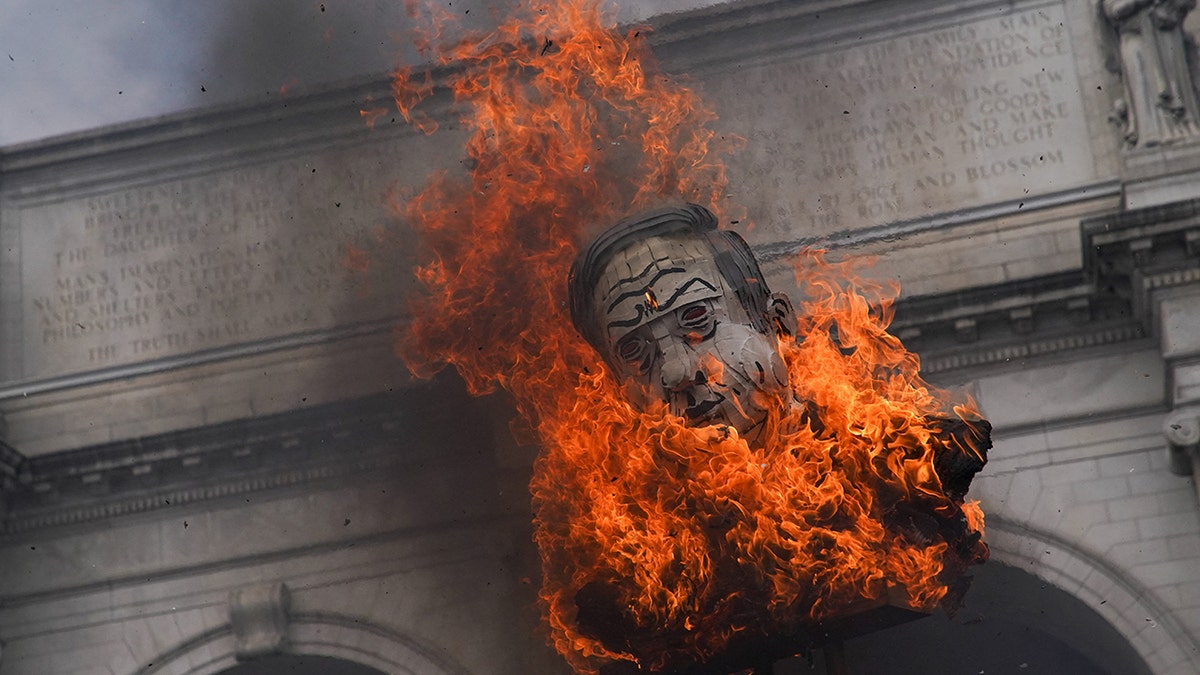
Anti-Israel demonstrators burn an effigy depicting Israeli Prime Minister Benjamin Netanyahu outside Union Station on the day of Netanyahu’s address to a joint meeting of Congress on Capitol Hill in Washington July 24, 2024. (Reuters/Nathan Howard)
The White House condemned the protests Wednesday evening, calling the chaos “disgraceful.”
“Identifying with evil terrorist organizations like Hamas, burning the American flag or forcibly removing the American flag and replacing it with another is disgraceful,” White House spokesperson Andrew Bates said in a comment to Fox News Digital Wednesday evening.
-

 World1 week ago
World1 week agoOne dead after car crashes into restaurant in Paris
-

 Midwest1 week ago
Midwest1 week agoMichigan rep posts video response to Stephen Colbert's joke about his RNC speech: 'Touché'
-

 News1 week ago
News1 week agoVideo: Young Republicans on Why Their Party Isn’t Reaching Gen Z (And What They Can Do About It)
-

 Movie Reviews1 week ago
Movie Reviews1 week agoMovie Review: A new generation drives into the storm in rousing ‘Twisters’
-

 News1 week ago
News1 week agoIn Milwaukee, Black Voters Struggle to Find a Home With Either Party
-

 Politics1 week ago
Politics1 week agoFox News Politics: The Call is Coming from Inside the House
-

 News1 week ago
News1 week agoVideo: J.D. Vance Accepts Vice-Presidential Nomination
-

 World1 week ago
World1 week agoTrump to take RNC stage for first speech since assassination attempt


